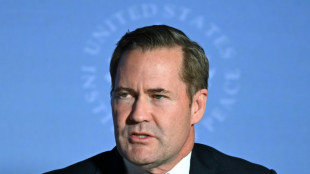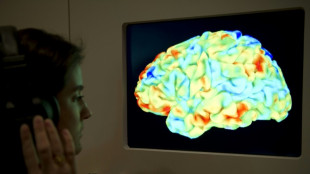
-
 Asian markets edge up but uncertainty rules ahead of Trump tariffs
Asian markets edge up but uncertainty rules ahead of Trump tariffs
-
Nintendo's megahit Switch console: what to know

-
 Nintendo to unveil upgrade to best-selling Switch console
Nintendo to unveil upgrade to best-selling Switch console
-
China practises hitting key ports, energy sites in Taiwan drills

-
 Oil, sand and speed: Saudi gearheads take on towering dunes
Oil, sand and speed: Saudi gearheads take on towering dunes
-
All eyes on Tsunoda at Japan GP after ruthless Red Bull move

-
 'Image whisperers' bring vision to the blind at Red Cross museum
'Image whisperers' bring vision to the blind at Red Cross museum
-
Hay shines as New Zealand make 292-8 in Pakistan ODI

-
 Other governments 'weaponising' Trump language to attack NGOs: rights groups
Other governments 'weaponising' Trump language to attack NGOs: rights groups
-
UK imposes online entry permit on European visitors

-
 How a Brazilian chief is staving off Amazon destruction
How a Brazilian chief is staving off Amazon destruction
-
Meme politics: White House embraces aggressive alt-right online culture

-
 China launches military drills in Taiwan Strait
China launches military drills in Taiwan Strait
-
US senator smashes record with 25-hour anti-Trump speech

-
 Brazil binman finds newborn baby on garbage route
Brazil binman finds newborn baby on garbage route
-
US senator smashes record with marathon anti-Trump speech

-
 Trump advisor Waltz faces new pressure over Gmail usage
Trump advisor Waltz faces new pressure over Gmail usage
-
Niger junta frees ministers of overthrown government

-
 Trump set to unleash 'Liberation Day' tariffs
Trump set to unleash 'Liberation Day' tariffs
-
Boeing chief to acknowledge 'serious missteps' at US Senate hearing

-
 Real Madrid hold Real Sociedad in eight-goal thriller to reach Copa del Rey final
Real Madrid hold Real Sociedad in eight-goal thriller to reach Copa del Rey final
-
Nuno salutes 'special' Elanga after stunning strike fires Forest

-
 PSG survive scare against Dunkerque to reach French Cup final
PSG survive scare against Dunkerque to reach French Cup final
-
Sundowns edge Esperance as crowd violence mars quarter-final

-
 Nottingham Forest beat Man Utd, Saka scores on Arsenal return
Nottingham Forest beat Man Utd, Saka scores on Arsenal return
-
Elanga wonder-goal sinks Man Utd as Forest eye Champions League berth

-
 Stock markets mostly advance ahead of Trump tariffs deadline
Stock markets mostly advance ahead of Trump tariffs deadline
-
US movie theaters urge 45-day 'baseline' before films hit streaming

-
 Saka scores on return as Arsenal beat Fulham
Saka scores on return as Arsenal beat Fulham
-
Third-division Bielefeld shock holders Leverkusen in German Cup

-
 Ball-blasting 'Torpedo bats' making waves across MLB opening weekend
Ball-blasting 'Torpedo bats' making waves across MLB opening weekend
-
Newsmax shares surge more than 2,000% in days after IPO

-
 Thousands of Hungarians protest against Pride ban law
Thousands of Hungarians protest against Pride ban law
-
GM leads first quarter US auto sales as tariffs loom

-
 Tesla sales tumble in Europe in the first quarter
Tesla sales tumble in Europe in the first quarter
-
No 'eye for an eye' approach to US tariffs: Mexico

-
 NFL club owners back dynamic kickoffs, delay tush push vote
NFL club owners back dynamic kickoffs, delay tush push vote
-
Trump 'perfecting' new tariffs as nervous world braces

-
 Trump nominee says to press UK on Israel arms
Trump nominee says to press UK on Israel arms
-
French court says Le Pen appeal ruling could come before presidential vote

-
 The battle to control assets behind Bosnia crisis
The battle to control assets behind Bosnia crisis
-
Prabhsimran powers Punjab to IPL win over Lucknow

-
 Mass layoffs targeting 10,000 jobs hit US health agencies
Mass layoffs targeting 10,000 jobs hit US health agencies
-
Tiger's April Foolishness: plan to play Masters just a joke

-
 Myanmar quake toll passes 2,700, nation halts to honour victims
Myanmar quake toll passes 2,700, nation halts to honour victims
-
Turkish fans, artists urge Muse to cancel Istanbul gig

-
 US seeks death penalty for accused killer of insurance CEO
US seeks death penalty for accused killer of insurance CEO
-
UK govt moves to block sentencing guidelines for minority defendants

-
 Trump puts world on edge as 'Liberation Day' tariffs loom
Trump puts world on edge as 'Liberation Day' tariffs loom
-
Swedish journalist jailed in Turkey kept 'isolated': employer


Divisive study finds link between fluoride and childhood IQ loss
A controversial new study out Monday in a US medical journal could reignite debate over fluoride's safety in water, linking higher exposure levels to lower IQ in children.
Published in the prestigious Journal of the American Medical Association (JAMA) Pediatrics, it has sparked pushback from some scientists who criticize the study's methods, defend the mineral's proven dental benefits, and warn the findings may not directly apply to typical US water fluoridation levels.
Its release comes as President-elect Donald Trump prepares to take office. His health secretary nominee, Robert F. Kennedy Jr., is a vocal critic of fluoridated water, which currently serves over 200 million Americans, or nearly two-thirds of the population.
Researchers from the National Institute of Environmental Health Sciences (NIEHS) reviewed 74 studies on fluoride exposure and children's IQ conducted in 10 countries including Canada, China, and India.
The same scientists helped formulate an official government recommendation in August that there is "moderate confidence" that higher levels of fluoride are linked to lower IQ scores.
Now, the team led by Kyla Taylor told AFP the new analysis found a "statistically significant association" between fluoride exposure and reduced IQ scores.
Specifically, the study estimates that for every 1 milligram per liter increase in urinary fluoride -- a marker of overall exposure -- children's IQ drops by 1.63 points.
- Study limitations-
Fluoride's neurotoxicity at high doses is well known, but the controversy lies in the study's suggestion that exposure below 1.5 milligrams per liter -- currently the World Health Organization's safety limit -- may also affect children's IQ.
Crucially, the paper does not clarify how much lower than 1.5 mg/L could be dangerous, leaving questions about whether the US guideline of 0.7 mg/L needs adjustment.
The authors acknowledged that "there were not enough data to determine if 0.7 mg/L of fluoride exposure in drinking water affected children's IQ."
Steven Levy, a member of the national fluoride committee for the American Dental Association, raised significant concerns about the study's methodology.
He pointed out that 52 of the 74 studies reviewed were rated "low quality" by the authors themselves but were still included in the analysis.
"Almost all of the studies have been done in other settings where there are other contaminants, other things we call confounding factors," he told AFP, citing coal pollution in China as an example.
Levy also questioned the study's use of single-point urine samples instead of 24-hour collections, which provide greater accuracy, as well as the challenges in reliably assessing young children's IQ.
With so many uncertainties, Levy argued in an editorial accompanying the study that current policies "should not be affected by the study findings."
The journal also published an editorial commending the study for its methodological rigor.
- Balancing gains against risks -
On the other side of the debate, the benefits of water fluoridation are well documented.
Introduced in the United States in 1945, it quickly reduced cavities in children and tooth loss in adults, earning recognition from the Centers for Disease Control and Prevention as one of the greatest public health achievements of the 20th century.
Fluoride, which also occurs naturally in varying levels, helps restore minerals lost to acid breakdown in teeth, reduces acid production by cavity-causing bacteria, and makes it harder for these bacteria to stick to the teeth.
However, with fluoride toothpastes widely available since the 1960s, some research suggests diminishing returns.
Proponents argue fluoridation reduces socioeconomic disparities in dental care, while critics warn it may pose greater risks of neurological harm to vulnerable communities.
"Evidence on the effects of adjusting levels of fluoride or interrupting community water fluoridation programs is critically needed, especially within the context of the US," Fernando Hugo, Chair of the NYU College of Dentistry, told AFP.
F.Dubois--AMWN

